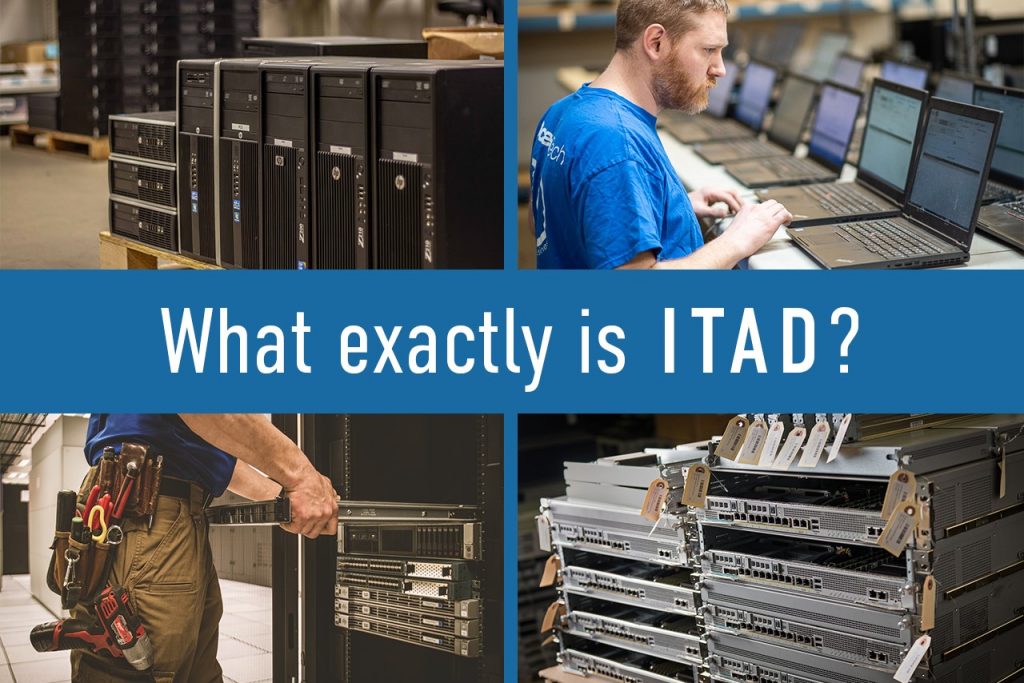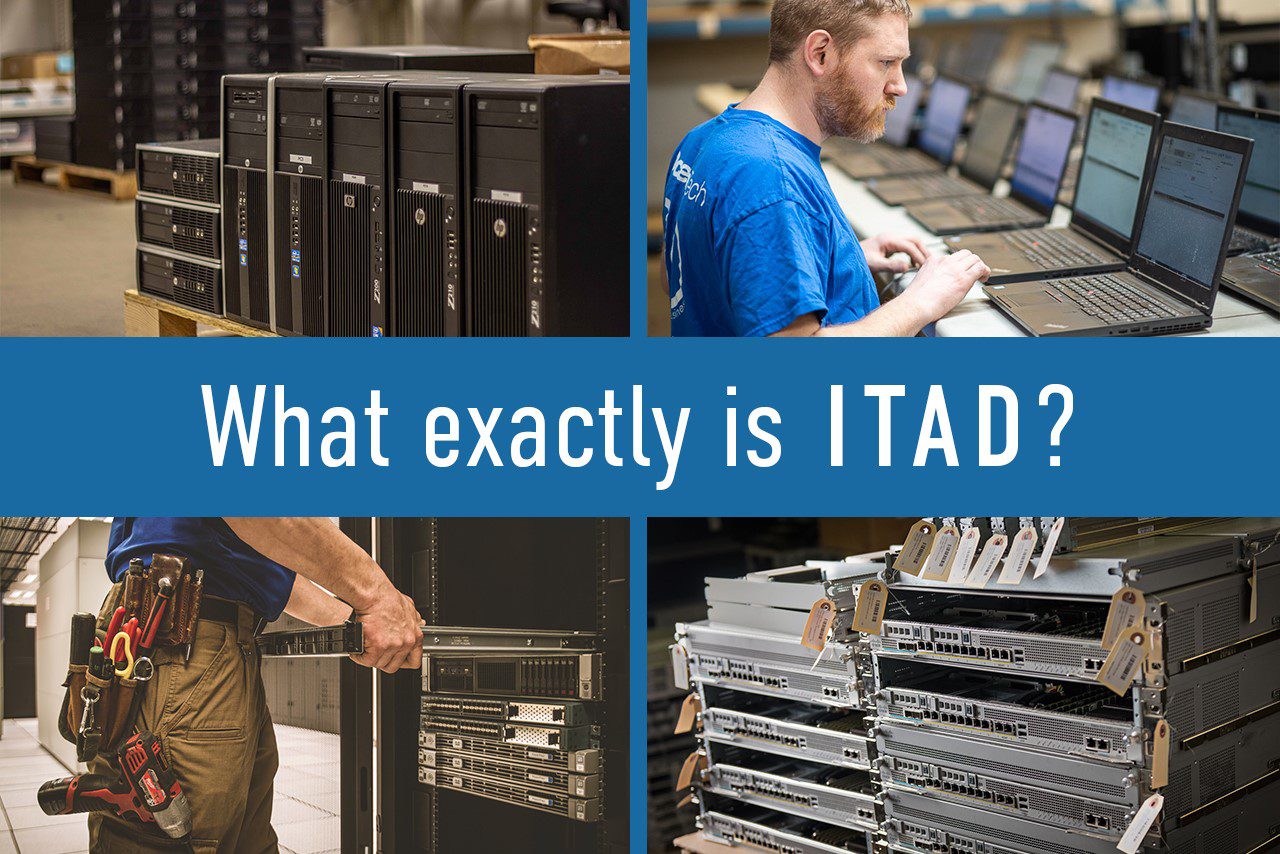It’s a good bet that technology plays a significant role in your place of business, no matter what industry you’re in. You can’t stay on top of your field without the correct computing tools, whether you manage an agro-business or a hedge fund. But what happens when your computers reach the end of their useful lives and must be retired? What are the safest ways to dispose of end-of-life equipment?
Because you don’t want unscrupulous actors to steal information from your old equipment, this creates a slew of data security concerns. It also poses environmental concerns, as you want to ensure that your outdated laptops aren’t causing harm to ecosystems or water supplies. IT asset disposal (ITAD) is a solution to this problem. So, what exactly is ITAD? It’s the process of safely discarding obsolete IT hardware and equipment. A good ITAD company will safely cleanse and dispose of your old devices. ITAD firms can also determine whether components of your unused equipment can be repurposed or resold.
Continue reading to find out more about how ITAD works and why it’s such a vital field in today?s society. We’ll also discuss how to spot a reputable ITAD firm and what these services can achieve for your company.
What is the significance of ITAD?
As a company grows, more computers and network equipment are required. Some of this equipment will reach the end of its useful life cycle, while others will need to be improved or replaced before that time comes. Dealing with IT asset disposal has become an increasingly critical issue due to the increasing sophistication of equipment and the frequent cycling through of that technology.

ITAD has also become more sophisticated as a result of data security and environmental considerations. The days of just shredding computer gear and tossing it into the rubbish heap are long gone. Computing equipment must now be disposed of properly to prevent heavy metals, chemicals, and other dangerous elements from entering our soil and water.
Similarly, data privacy requirements have altered how businesses, organizations, and governments dispose of obsolete equipment.
A professional ITAD services provider can assist your company tackles these problems while also helping you save money in your IT budget. Your ITAD service provider should be able to recycle or refurbish the majority of your old equipment, and possibly even resell the devices that still have some life remaining in them. This means you’ll be able to put more money back into your budget, making it easier to keep your IT infrastructure up to date.
Data Center Expansion and IT Expansion
It’s probably not surprising to find that IT sales are increasing in almost every category. This is a result of the increasingly data-driven and connected society in which we all live and work. According to industry observers, the surge in IT spending is expected to continue in the future.
Global spending on all types of devices is anticipated to exceed $705 billion in 2021, according to Statista. This is an increase of 8% over 2020. In 2021, total IT investment is expected to reach $3.92 trillion, up 6.2 percent from 2020. ?
The increase in investment is most noticeable in the data center. According to Statista, data center system expenditures are expected to reach $228 billion in 2021, a 6.2 percent raise over the previous year.
None of this comes as a surprise. Data has never been more important in business than it is now. Data-driven techniques like artificial intelligence and machine learning are being discovered by a growing number of industries as a way to revolutionize the way they do business. This inevitably leads to increased IT spending, especially as businesses try to keep up with the competition.
So, what does it all mean? To be successful today, your company must have a strategy in place for managing its physical assets. This plan will need to account for the entire life cycle of your IT assets, from procurement to disposal, in order to be genuinely effective. In an ideal world, that strategy would also include cost-cutting initiatives.
Data Security’s Price Tag
Businesses lose millions of dollars each year as a result of data breaches. According to the Ponemon Institute, the average data breach costs $3.86 million and can last up to 200 days, resulting in significant economic and productivity loss. Customer trust can be eroded by data breaches, which can put even the most successful businesses into a downward spiral from which it is impossible to recover.
According to popular belief, hackers are thought to target only government entities and large enterprises.? Contrary to popular belief, this is not the case. Small and midsize businesses are frequently targeted by hackers because they know that many small organizations make shortcuts when it comes to security.
Many small firms operate on a shoestring budget, so they don’t invest in network security, employee training, or properly disposing of unwanted IT assets.
Of course, data breaches aren’t merely a financial problem. International, national, and municipal rules can all impose severe penalties on anyone who fails to secure personal information. These regulations, such as the General Data Protection Regulation (GDPR), affect not only enterprises in the regulated regions, but also anyone who conducts business with them. If you fail to comply with data privacy standards, you could face harsh consequences.
Data Security and ITAD
Your old gear still has data on it, and it’s extremely probable that it contains sensitive information about your staff and customers. If you dispose of obsolete equipment without first erasing the data on it, you risk exposing personal information to hackers or identity thieves.
Fortunately, ITAD companies follow best practices for rigorous data sanitization, ensuring that none of your personal information is exposed. As a result, your customers can have faith in your abilities to protect their personal information. Of course, this implies that your company will be safe from anyone who might try to steal data from your old devices, and you will not be accountable for any penalties incurred as a result of a data breach.
IT asset recovery is a related service provided by ITAD experts. IT asset recovery can help you get the most value out of your retired or obsolete computing hardware while ensuring that no data is lost.
Endpoint Devices and ITAD
When you think of data security, you probably think of a data center, but staff cell phones and other devices are also at risk of data breaches at the point of disposal. As ?Bring Your Own Device? (BYOD) grows more widespread, businesses will need to be more watchful in this area.
ITAD providers may recycle almost any type of obsolete hardware, including cell phones, tablets, and laptops. They may also assist your organization in developing a long-term strategy for disposing of and tracking all of the equipment used to run your business. A data sanitization policy should be part of that plan. It should also include a method for determining whether or not a device can be reused and when it should be discarded. ?
Recycling and Reusing
A good ITAD services provider can assist you in developing a strategy for greater sustainability. This necessitates a thorough examination of the possibilities for repurposing any device within your organization. It also entails looking at secondary and tertiary markets for data center equipment that could be repurposed (after being sanitized of data, of course).
There’s also a growing trend toward repairing and repurposing equipment whenever possible, which feeds into the sustainable hardware movement and a goal of zero waste. In the end, this is a win-win situation because it saves money for businesses while also lowering the stress on global resources.
An ITAD service provider should be dedicated to being a responsible steward of your ? and the world’s ? resources.

As the editor of the blog, She curate insightful content that sparks curiosity and fosters learning. With a passion for storytelling and a keen eye for detail, she strive to bring diverse perspectives and engaging narratives to readers, ensuring every piece informs, inspires, and enriches.










